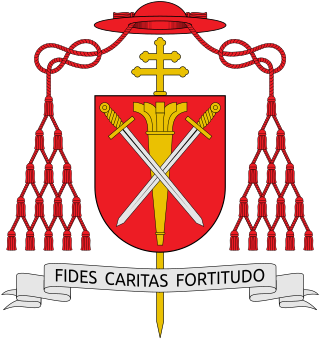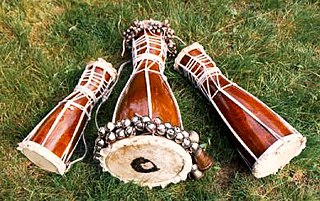Queen or QUEEN may refer to:

Ọṣun, is an orisha, a spirit, a deity, or a goddess that reflects one of the manifestations of the Yorùbá Supreme Being in the Ifá oral tradition and Yoruba-based religions of West Africa. She is one of the most popular and venerated Orishas. Oshun is an important river deity among the Yorùbá people. She is the goddess of divinity, femininity, fertility, beauty and love. She is connected to destiny and divination.

Oduduwa was a Yoruba divine king. According to tradition, he was the holder of the title of the Olofin of Ile-Ife, the Yoruba holy city. He ruled briefly in Ife, and also served as the progenitor of a number of independent royal dynasties in Yorubaland. His name, phonetically written by Yoruba language speakers as Odùduwà and sometimes contracted as Ooduwa, Odudua or Oòdua, is today venerated as that of "the hero, the warrior, the leader and father of the Yoruba race". Through conflict and mostly, through diplomacy lasting many years, Oduduwa was able to temporarily usurp the throne of Ife to become King.

Obatala is an orisha in the Yoruba mythology that was given the task to create the Earth but failed the task by being drunk on palm wine and was outshined by his little brother Oduduwa. As punishment for his negligence's to an important task he was given the job to create humans beings. This was authorized by his father, Olodumare which gave Obatala the name sculptor of mankind.
"Now Olodumare [the supreme being] once called on Obatala and told him that he would love him to assist in creating human beings that would live in the world he was about to create. This is because as he (Olodumare) said further he would not like the world he was planning to create to exist without human beings."
The term "high priest" usually refers either to an individual who holds the office of ruler-priest, or to one who is the head of a religious caste.
Enchantress most commonly refers to:

Anthony Olubunmi Okogie is a Nigerian Cardinal Priest and Archbishop Emeritus of Lagos in the Roman Catholic Church.

The Oyo Empire was a powerful Yoruba empire of West Africa made up of parts of present-day eastern Benin and western Nigeria. It grew to become the largest Yoruba-speaking state and rose through the outstanding organizational and administrative skills of the Yoruba people, wealth gained from trade, and a powerful cavalry. The Oyo Empire was one of the most politically important states in the entirety of Western Africa from the mid-17th to the late 18th century, and held sway not only over most of the other kingdoms in Yorubaland, but also over nearby African states, notably the Fon Kingdom of Dahomey in the modern Republic of Benin on its west.

Nigerian literature may be roughly defined as the literary writing by citizens of the nation of Nigeria for Nigerian readers, addressing Nigerian issues. This encompasses writers in a number of languages, including not only English but Igbo, Urhobo, Yoruba, and in the northern part of the county Hausa and Nupe. More broadly, it includes British Nigerians, Nigerian Americans and other members of the African diaspora.

The Batá drum is a double-headed drum shaped like an hourglass with one end larger than the other. The percussion instrument is still used for its original purpose as part of traditional religious activities among the Yoruba. Batá drums have been used in the religion known as Santería in Cuba since the 1800s, and in Puerto Rico and the United States since the 1950s. Today, they are also used for semi-religious musical entertainment in Nigeria and in secular, popular music. The early function of the batá was as a drum of different gods, of royalty, of ancestors and a drum of politicians, impacting all spheres of life in Yoruba land.

Moremi Ajasoro was a legendary Yoruba queen and folk heroine in the Yorubaland region of present-day southwestern Nigeria who is fabled to have assisted in the liberation of the Yoruba kingdom of Ife from the neighbouring Ugbo Kingdom.
The soucouyant or soucriant in Dominica, St. Lucian, Trinidadian, Guadeloupean folklore in Haiti, Louisiana, Grenada and elsewhere in the Caribbean or Ole-Higue in Guyana, Belize and Jamaica or Asema in Suriname), in The Bahamas and Barbados it is known as Hag. It is a kind of blood-sucking hag.

The Yoruba people are a West African ethnic group that mainly inhabit parts of Nigeria, Benin, and Togo. The areas of these countries primarily inhabited by Yoruba are often collectively referred to as Yorubaland. The Yoruba constitute more than 42 million people in Africa, are a few hundred thousand outside the continent, and bear further representation among members of the African diaspora. The vast majority of the Yoruba population is today within the country of Nigeria, where they make up 21% of the country's population according to CIA estimations, making them one of the largest ethnic groups in Africa. Most Yoruba people speak the Yoruba language, which is the Niger-Congo language with the largest number of native or L1 speakers.

The Eyo Festival, otherwise known as the Adamu Orisha Play, is a Yoruba festival unique to Lagos, Nigeria. In modern times, it is presented by the people of Lagos as a tourist event and due to its history, is traditionally performed on Lagos Island.
Distinctive cultural norms prevail in Yorubaland and among the Yoruba people.

The Akure Kingdom is a traditional state with headquarters in Akure, Ondo State, Nigeria. It is the successor to an ancient Yoruba city state of the same name. The ruler bears the title "Deji of Akure".

Yemi Eberechi Alade, is a Nigerian Afropop singer, songwriter, actress and activist. She won the Peak Talent Show in 2009 after which she signed to Effyzzie Music Group, and had a hit with her single "Johnny" in 2014. Since then Yemi has gained prominence in the music industry and considered one of the biggest artists in Africa. Following the releases of her albums King of Queens and Mama Africa with huge commercial success recorded for both albums, she embarked on world tours consecutively.
Iyalawo is a term in the Yoruba language that literally means Mother of Mysteries or Mother of Wisdom. Some adherents use the term "Mamalawo," which is a partially African diaspora version of the Yoruba term, Iyaláwo and Yeyelawo are two more versions of mother of mysteries. Ìyánífá is a Yoruba word that can be translated as Mother (Ìyá) has or of (ní) Ifá or Mother in Ifá.
Iyami Aje is a Yoruba term of respect and endearment used to describe a woman of African ancestry who is considered to be an Aje, a woman who wields myriad arcane creative biological, spiritual, and cosmic powers.
The Iyalode is a high-ranking female chieftain in most of the Yoruba traditional states. The title is currently within the gift of the obas, although Njoku asserted in 2002 that the process of choosing an Iyalode in pre-colonial Nigeria was less of a choice by the monarch, and more of the accomplishment and involvement of the woman to be so honoured in economic and political matters.











